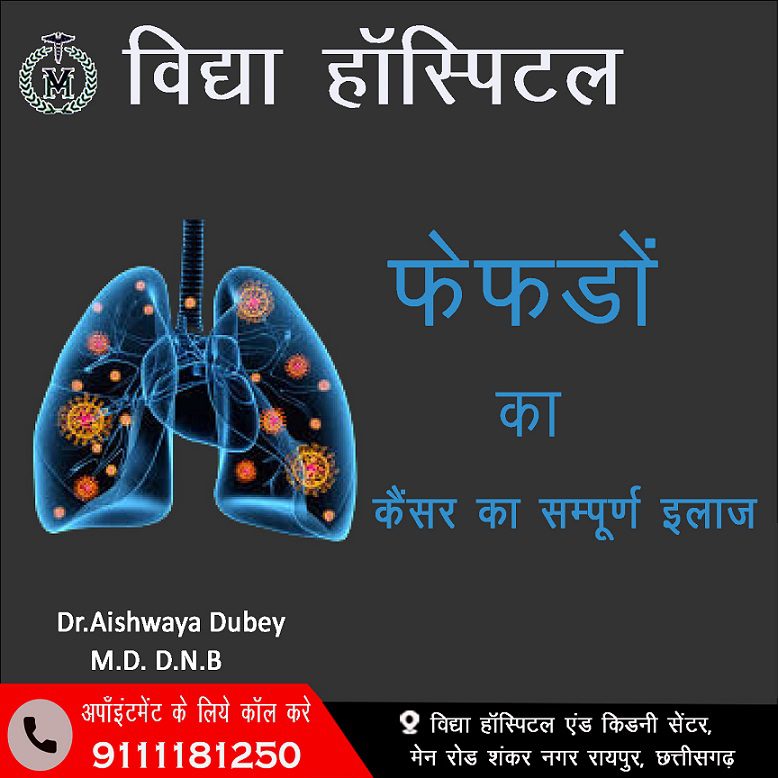Contents
- 1 What is lung cancer?
- 1.1 Who gets lung cancer?
- 1.2 What are the stages of lung cancer?
- 1.3 What are the types of lung cancer?
- 1.4 Small cell lung cancer
- 1.5 What are symptoms of lung cancer?
- 1.6 How is lung cancer diagnosed and managed?
- 1.7 How is lung cancer treated?
- 1.8 Chemotherapy and targeted therapies
- 1.9 Surgery
- 1.10 BOOK CONSULTATION WITH THE BEST PULONOLOGIST NOW
- 2 OR
- 3 EMERGENCY- CALL- 9111181250 24 hour Emergency and Ambulance services available.
- 4 Vidya hospital and kidney centre
What is lung cancer?
Like other cancers, lung cancer develops when normal processes of cell division and growth are disrupted, giving way to abnormal, uncontrollable growth. The cells grow into a mass, or tumor. Any abnormal growth in the body that directly invades surrounding tissues and organs, spreads to other parts of the body, or has the potential to grow back after being removed is called “malignant,” or cancerous.
Who gets lung cancer?
Lung cancer can take several years to develop. Cigarette smoking is the most common risk factor for developing lung cancer. Many people exposed to cigarette smoke – or some of its components – will end up with permanent abnormal changes in their lungs. These changes can cause a cancerous tumor to develop within the lung. Twenty-five percent of all cases of lung cancer worldwide are diagnosed in people who have never smoked. The underlying cause in these cases is not well understood. Two out of three people diagnosed with lung cancer are over age 65. The most common age at diagnosis is 70 years.
What are the stages of lung cancer?
Staging allows the physician to fully understand the extent of the patient’s cancer to determine treatment decisions and predict expected outcomes. Doctors use specific terms to describe the stages of cancer, but a straightforward way of describing staging might be as follows:
Localized: The cancer is confined to the lung.
Regional: The cancer has spread to lymph nodes (or glands) within the chest.
Distant: The cancer has spread (or metastasized) to other parts of the body.
What are the types of lung cancer?
Non-small cell lung cancer
Non-small cell lung cancer is much more common, and usually grows and spreads more slowly than small cell lung cancer. There are three main types of non-small cell lung cancer are
Adenocarcinoma often starts growing near the periphery of the lung and may vary in both size and growth rate.
Squamous cell carcinoma usually starts in one of the larger breathing tubes near the center of the chest.
Large cell carcinoma often starts near the periphery of the lung, grows rapidly and is usually quite extensive when diagnosed.

Small cell lung cancer
Small cell lung cancer is less common than non-small cell lung cancer accounting for about 15 percent of all lung cancers. This type of lung cancer grows rapidly, is likely to be advanced by the time of diagnosis and spreads to other parts of the body quickly.
What are symptoms of lung cancer?
- Coughing that does not improve
- Hoarseness
- Blood in phlegm or sputum that is expelled by coughing
- Weakness
- Wheezing
- Infections that return or will not clear
- Chest pain that gets worse with cough or laugh
- shortness of breath
- chest pain
- fatigue
- unintentional weight loss
How is lung cancer diagnosed and managed?
Usually, concern that a patient may have lung cancer starts as an abnormal finding on a chest imaging study (chest X-ray or CT scan) .Diagnosis requires a biopsy, or the removal of cells or tissues from the suspicious mass. Biopsies can be performed through a camera fed through the breathing tubes (called bronchoscopy) or from a needle inserted through the skin into the lung tumour. The biopsy is important in determining whether or not it is cancer, and to determine which type of lung cancer.
How is lung cancer treated?
Lung cancer is a very challenging cancer to treat. Cell type and stage are the most critical factors in determining the survival rate is the stage at the time of diagnosis. Those that are diagnosed at a localized stage may be curable. Unfortunately, most people are diagnosed when the disease has spread outside the chest (advanced or distant) or involves the nodes in the chest (regional). Also, the lungs are very sensitive organs and may not handle some forms of treatment easily.The overall two-year survival rate of those diagnosed with lung cancer is 25%. At five years, survival rate drops to 15%.
Chemotherapy and targeted therapies
Chemotherapy is the use of drugs that are designed to kill rapidly growing cells, such as cancer cells. Chemotherapy may be injected directly into a vein (by IV, or intravenously) or given through a catheter, which is a thin tube placed into a large vein and kept there until it is no longer needed. Some chemotherapy drugs are taken orally in pill form.
Targeted agents are a newer class of drugs that are designed to act against specific weaknesses in cancer cells or surrounding supportive tissues, such as blood vessels. These drugs can also be taken orally or by IV. They are most effective in cancers with specific changes in their genes or cell receptors.
Chemotherapy affects both normal cells and cancer cells. Your doctors will try to prevent side effects as much as possible while treating the cancer appropriately. Side effects depend largely on the specific type of drug and the amount given. They can be different for each person and may be only temporary. Common side effects of chemotherapy include nausea and vomiting, hair loss, mouth sores and/ or fatigue. Your healthcare providers can suggest ways to make any side effects manageable and to help improve symptoms that may occur during and after procedures.
Radiation therapy
Radiation therapy is a form of high energy X-ray that kills cancer cells. It can be used as a primary treatment, or in combination with chemotherapy (with or without surgery). It often can play an important role in advanced cancer patients by providing relief from pain, blockage of the airways, shortness of breath or coughing.
Radiation therapy is a “focused” treatment, meaning it is designed to maximize its effect on the cancer cells while minimizing injury to normal cells. Radiation to treat lung cancer most often comes from a machine (external radiation). Occasionally, the radiation may be delivered internally using tubes that place a radioactive seed directly near the tumor (internal radiation or brachytherapy).
Side effects of radiation therapy depend mainly on the part of the body that is treated and the treatment dose. Common side effects of radiation therapy to the chest are a dry, sore throat; difficulty swallowing; fatigue; skin changes at the site of treatment; and/or loss of appetite.
Surgery
Surgery is still considered the “gold standard” for treating early-stage lung cancer. Removing the tumour and surrounding lung tissue gives the best chance for cure for patients whose disease is localized. Surgery should be performed by specialized thoracic surgeons with particular expertise in treatment of lung cancer and other chest malignancies. Your surgeon will determine whether a tumour is removable
BOOK CONSULTATION WITH THE BEST PULONOLOGIST NOW

OR
EMERGENCY- CALL- 9111181250
24 hour Emergency and Ambulance services available.
What types of surgery are used to treat lung cancer?
Limited resection: An operation to remove only a small portion of the lung is called a segmental or wedge resection.
Lobectomy: Removal of a defined section of the lung, (there are three lobes of the lung on the right and two on the left), is a lobectomy. This is the most common surgery performed for lung cancer.
Pneumonectomy: The removal of an entire lung is called a pneumonectomy.
Recovery after thoracic surgery depends on the extent of the surgery, whether or not it is performed minimally invasively, as well as the age and overall fitness of the patient.
How can I prevent lung cancer?
- Do not smoke. If you do smoke, quit. Avoid breathing in smoke from people who do smoke.
- Avoid air pollution, such as exhaust from diesel engines
- Eat a healthy diet.
- Exercise regularly.
What is the outlook for people with lung cancer?
Your healthcare providers will help you understand what to expect after cancer treatment in terms of follow-up care, lifestyle changes, and making important health-related decisions. If lung cancer is localized or regional and treatment has been administered with the intention of curing the cancer, follow-up testing will be performed to ensure the cancer does not recur. You also will be assessed for side effects related to the treatment received, and treatment will be offered to help with any related symptoms.
BOOK CONSULTATION WITH THE BEST PULONOLOGIST NOW
To get more information about Lung cancer use the links below
Vidya hospital and kidney centre
Address: Shankar nagar Main road, Raipur(CG)
Email: vidyahospital32@gmail.com
Phone: 9111181250, 07714281198,9827197924